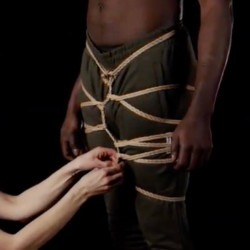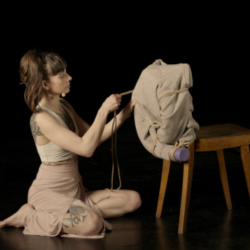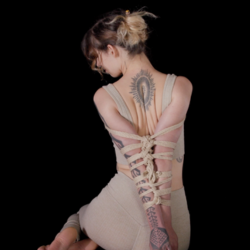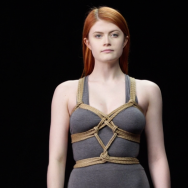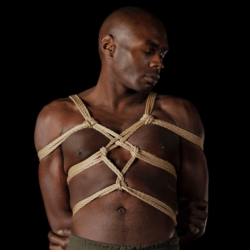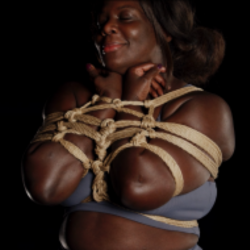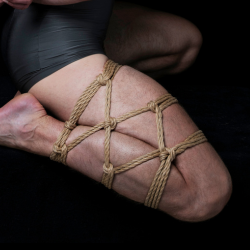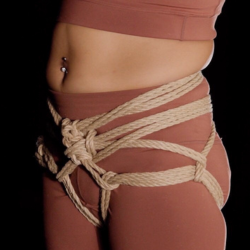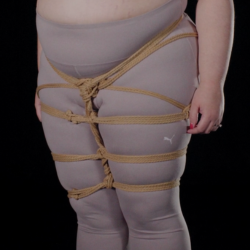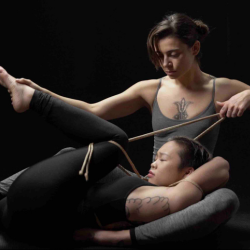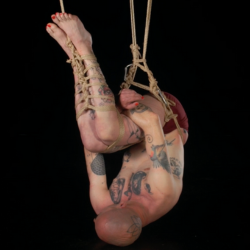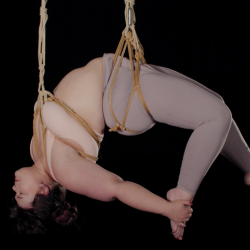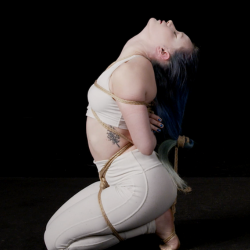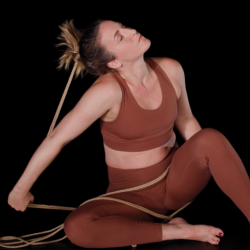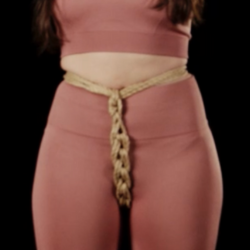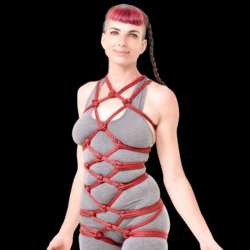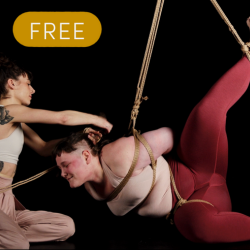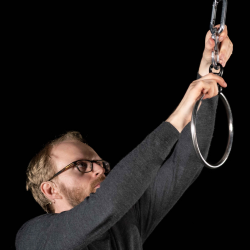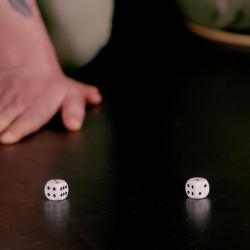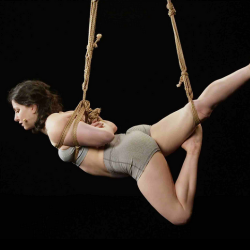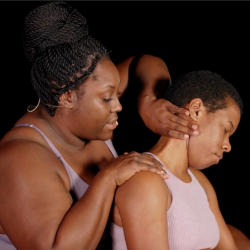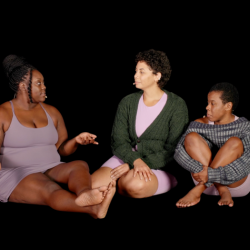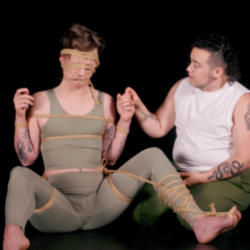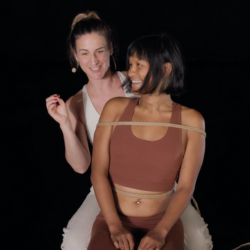EP 41
NATALIE ROSE
It's actually a crossing knot, not a Munter hitch! In this episode, Natalie Rose discusses their rope journey, the dynamics of being in a property-owner relationship, and the significance of communication and platonic kink in their practice.

Natalie Rose (they/she) is a lifestyle coach and kink educator dedicated to fostering a welcoming and inclusive environment for individuals to explore their interests in rope bondage. Their practice centers around platonic kink, with a particular passion for rope suspensions. With over a decade of experience, they offer exclusive tying sessions and private tuition in a discreet rope space located in the vibrant city of Portland, Oregon.
https://www.natalieroserope.com/
Instagram: @natalierose_fet
[00:00:10] Wicked Wren Hello to all my guys, gals and non-binary pals. Welcome to the Shibari Study Podcast. I'm your host, Wicked Wren. Shibari Study is an online learning resource offering video tutorials for beginners or advanced practitioners. Whether you're brand new to the world of shibori and needing to learn the basics, or a seasoned rigger rope bottom seeking inspiration to push your practice to new places, there's something for you at shibaristudy.com. Today, I'm talking to Natalie Rose. Nat uses they/she pronouns. Nat is a lifestyle coach and (…) educator, dedicated to fostering a welcome and inclusive environment for individuals to explore their interest in rope bondage. Nat's practice centers around platonic (…) with a particular passion for rope suspensions. With over a decade of experience, Nat offers exclusive tying sessions and private tuitions in a discreet rope space located in the vibrant city of Portland, Oregon. Hello, Nat. How are you?
[00:01:10] Natalie Rose Hi. How are you?
[00:01:12] Wicked Wren I'm so good.
[00:01:13] Natalie Rose It's a vibrant city of Portland.
[00:01:16] Wicked Wren I was thinking to myself, maybe I don't say the vibrant part, but I included it because I was like, you know what? It's kind of a fun one.
[00:01:24] Natalie Rose It's good. Yeah, true.
[00:01:25] Wicked Wren I do like– do you like Portland?
[00:01:27] Natalie Rose I do like Portland. I've lived here for an awful long time. And I, I've had my fair share of traveling, but, you know, home is home. So. And Portland is that place.
[00:01:39] Wicked Wren Did you grow up in Portland?
[00:01:41] Natalie Rose I kind– I grew up in Oregon. So not in Portland. But yeah.
[00:01:47] Wicked Wren I remember the first time I went to Portland, I had a marionberry.
[00:01:51] Natalie Rose Yes.
[00:01:54] Wicked Wren I feel like it's everybody's first Portland thing to do. You have to have a marionberry.
[00:01:57] Natalie Rose Yeah. And Voodoo donuts. Yeah.
[00:01:59] I did. But we got a Voodoo Donuts in LA. So I went– what's that place that's next to Voodoo Donuts? I think it's Blue Star or something, like that.
[00:02:12] Natalie Rose I'm– sorry. Yeah, Blue Star Donuts is... You know I'm going to say, you know, I'm sure that people don't agree with me, but Blue Star Donuts is better than Voodoo Donuts.
[00:02:23] Wicked Wren You're really bringing out the controversial takes in the middle of podcast.
[00:02:27] Natalie Rose I know, sorry.
[00:02:28] Wicked Wren I can see our viewership just tanking. So there are a ton of things I want to talk about. You have a wealth of knowledge. You've been tying together and you do a lot of super unique things in rope that I haven't seen anyone else do. I think to start this, I would like to chat about what being a lifestyle coach is.
[00:02:51] Natalie Rose Yeah. I mean, my, it's, it is, it's not necessarily my career. My career lies elsewhere, but a lifestyle coach is really bringing, helping people to recognize that they already have the tools to get through a difficult situation and bringing those tools out of hiding and bringing them back into use so that they can figure out themselves if they... That they can definitely get through a difficult situation, or they can definitely restructure to match their desires or goals financially or relationships or, or whatever it might be. So yeah.
[00:03:35] Wicked Wren Did you have somebody that inspired you?
[00:03:40] Natalie Rose I don't know. I mean, sure, my mom and dad have, did a fantastic job. I'm just a little bit – probably too much information – but I'm adopted. And my mother, my adoptive mother was Japanese and my adoptive father was Chinese. So talking about growing up in a clashing kind of atmosphere, those cultures, I think are very... one part of being in those cultures, specifically Japanese, is you have the capability to do anything that you want to do. You just have to do it. You can't sit back and say, I want to do this, or I want to do that, or someone needs to help me to do that. It's just my mom taught me, Listen, if you want to do it, just do it. Wake up in the morning and do it. So I think a lot of people, especially when they're bogged down by stresses, they forget that they have the capability to do the thing. And lifestyle coaching is all about, you know, reminding those people that you can do it. Let's find, find those skill sets in your tool bag and bring them out so that you can use them.
[00:05:00] Wicked Wren It's a really powerful thing for parents to say. If you want to do it, just do it. Huge.
[00:05:04] Natalie Rose Yes. Yes. Yeah.
[00:05:07] Wicked Wren When did you find (…)?
[00:05:09] Natalie Rose I found (…)... You know, I, you know, I think we all say the same thing. We've all always been (…), right? I've always been (…). I've always been poly. But I was introduced to the rope community in 2013. At that time, I had teenagers living in the house, and I had also started a relatively new relationship. And I didn't want to be quiet when we had those intimate times. So we chose to go to, for the first time, go to a (…) club in Portland. And there, there was a person that was playing with some rope and I'm not a stand back kind of person, more or less, I just walked right up to that person and said, What are you doing with this rope at a (…) club?
[00:06:02] Wicked Wren I love it.
[00:06:04] Natalie Rose That was my first suspension.
[00:06:08] Wicked Wren Wow. That's amazing. And you, obviously you loved it.
[00:06:12] Natalie Rose I loved it. And the very next day created a FL account. And. And then we were off to the races, I suppose.
[00:06:20] Wicked Wren I have a question. Do your kids know that you're (…) now?
[00:06:23] Natalie Rose Yeah. I'm a very open parent. I've always been a very open parent. And I didn't hold anything back. And, and this was something that was going to affect my whole life. Help me with my stresses, add more stresses. Just kind of– it reshaped everything that was happening in my life at that time and continues to do so today. So, yes, they've been, they've been fully aware of everything that's happened since day one. And, and have wavered in and out of the community. My daughter used to help. I have a team of people that I work with. Really good friends and and, you know, rope family that helps to teach and perform. And she used to be a part of that as well. So, she's gotten married and moved to California, so, she's no longer in the house and a part of that thing, but, yeah, they're fully aware.
[00:07:23] Wicked Wren That's so cool. Were you nervous to talk to them about them? No?
[00:07:27] No. No, I was nervous to talk to them about their new and fresh and maybe first encounters with (…). But I was not nervous about sharing my own passions with them. Yeah.
[00:07:40] Wicked Wren What was that trajectory after you found rope? You got suspended. You're in. You made a FL. What was the next thing that happened?
[00:07:49] Natalie Rose Yeah. So my partner and I, we sat down and we talked about, you know, what this rope thing was going to be like and how it was going to change, how we were going to allow it to change our lives. We both decided that, it was a really good addition and fun and, you know, infusing new things into lives and relationships most times are beneficial. And in our case, it was. So we decided that we were going to take at least once a month, if not more, private lessons. And then we started taking class lessons on top of that. And then we started traveling to do cons on top of all of that. And we were very quick to suspension. So I think it was probably 4 or 5 months in, with rope in our hands every day. We were suspending. So, yeah.
[00:08:42] Wicked Wren That's amazing. You've said that something that's huge for you is the relationship between the tying pairs and how that works and how you grow.
[00:08:51] Natalie Rose Yes, absolutely. I mean, I think the strongest tying pairs, because you're doing something dangerous together and most people are learning. You know, when you're talking about a soft skill like rope, you're talking about forever learning. You don't ever reach a point of skill set that should ever dictate that you are done learning. So... Infusing the desire to continue to learn new things into any kind of relationship I think is really wholesome, and it allows you to grow, not just grow as a person, but grow together as a tying pair. And I think those partnerships are probably the most successful ones, are the ones that are friendship based and not hierarchical relationship based. You know, like the (…) relationships or the (…) relationships. I think putting more on that type of structure is probably more difficult as a tying pair. So..
[00:09:56] Wicked Wren Was that something you've had to learn, or do you always feel that way in regards to a strict (…) type thing? Or have you always been...?
[00:10:09] Natalie Rose I think, I mean, my... [00:10:10]I'm in an owner-property relationship. [1.8s] I am someone's property.
[00:10:14] Wicked Wren That's why I asked this.
[00:10:16] Natalie Rose I am someone's property, but I'm a very A++ person. And if it doesn't meld... If it doesn't... Seamlessly meld into a life that is extreme; I mean, all of our lives are built to be very vanilla. Most of us aren't making money that are not inside the (…) world. Most of us live many hours of the day that have nothing to do with (…). So unless it is something that can seamlessly be, you know, wave and flow in and out of the vanilla life. For me, myself specifically, it's just not going to be very effective. So that, because I am that person, I think I realized through trial and error in the beginning, I chose to be a submissive on the right side of the slash, so, because the rest of my life is all on the left side of the slash. And I just, I don't want to, I don't want to pick what clothes I wear every day. I don't want to pick what food I'm eating. I just, I just don't. I make so many other decisions. I just don't want to make those decisions. And a strong (…) inside of a two man athletic event, that's dangerous, was very clear to me in the beginning that it was going to be... Not going to work if I was going to be a right sided submissive, that was half of a team. So that that was a pretty steep learning curve. Like I, I think we figured that out in the first month or two that I just I wasn't going to quietly take the stuff that was happening to me.
[00:12:05] Wicked Wren What do you think has made your relationship so successful for so long?
[00:12:12] Natalie Rose Yeah. Like, you know, I'm I'm in it for ten years and we very quickly got into (…) in the beginning and our partnership has, you know, progressed throughout that whole thing. I think progressed is a very strong word. You both do well and take steps forward, and you do not so well and take steps back. I think that's just life. But communication, you know.
[00:12:40] Wicked Wren Are you approaching communication in a very scheduled, rigid way, or are you doing it when it comes up naturally?
[00:12:49] Natalie Rose Yeah. In the beginning of our (…) relationship before but before we progressed into owner property. It was really scheduled. Just like many, many things in hierarchical relationships. It's all very scheduled. On a poly calendar, there's systems in place for if a submissive wants to do, say, be something that they have to approach the, the dominant in the relationship and, and present those things in a way that supports the (…) relationships. And that, too, became very clear that it wasn't very effective for me. So organically growing my relationship while it is under strict restriction of communication, those two things were... Polar opposites for me. So yes, everything has to be dealt with when they happen.
[00:13:43] Wicked Wren Yeah. I'm asking so many questions about this because I think a lot of folks want this type of dynamic. A lot of people want to be property. A lot of people want to be owners. But we see a lot of instances of it not going super great. So, and you are an instance of it going very very great. So that's why I'm digging into this so much. Did you approach the relationship, but with the idea of I will let whatever happens happen? Or did you know you wanted an owner property type of dynamic?
[00:14:23] Natalie Rose Yeah, I had no clue. I had no clue. We morphed it into an owner property.
[00:14:28] Wicked Wren Because that's what felt right?
[00:14:31] Natalie Rose Yeah, I don't... I mean we started out with (…) and exploring through protocols and rituals. That was not so fun to explore through those kinds of things. And then we started journaling. Journaling was great because we didn't have to redo our mistakes that we had already made. And then we went into a contract, and a contract didn't seem to suit us very well because we had made the commitment to actually get legally married. So that seemed to be a secondary, unnecessary step on top of things. The one thing that's really cool about contract writings, or being involved in contracts as a (…) in a hierarchal relationship is that you build in an exit strategy or exit steps into a contract. And you don't do that when you're in just a normal relationship or even a marriage. So it really set our marriage up really, really well and very strong, because we were doing contract writing at the time and exploring those things. So we have great exit strategies, which keeps us away from taking the steps to be in the situation where we're exiting. So, I love that. Yeah.
[00:15:52] Wicked Wren I've got to ask, what are the exit strategies? Because I think a lot of people should have them. Like you said, it doesn't mean you're going to use it, but it should be there in case. How do you negotiate that kind of thing?
[00:16:06] Natalie Rose Yeah, exit strategies are very strange to talk about. But the [00:16:10]most successful exit strategy or exit steps are ones that are done when you're getting along and communicating well. [8.6s] The worst ones are when you're broken and you don't communicate well, and all you do is yell and scream and fight. So if you recognize in human nature, those are the steps that we as humans are going to do to each other. We're going to get upset. We're not going to get our way. We're not going to get hurt. And, and we need to leave. So you build when you're communicating well and you're in good relationships, you build those recognizable steps in ahead of time so that you can go back to them and say, I'm recognizing that we are in this step and possibly in trouble. These are the things that we talked about ahead of time two years ago when we were doing well. I'm willing to take the step now. I'm willing to either go through therapy or, or take additional steps, whatever you negotiate. Are you willing to do that with me now? You know, so those are... It's, it's hard to do them when you're pissed and upset and broken. But, it's really easy and very nurturing when you do that when you're in a good relationship, at a time in your relationship, you're communicating well. So... Yeah.
[00:17:31] Wicked Wren The only exit strategy we really have is just being angry at each other. That's the general thing that happens. And also when people talk about prenups and things.
[00:17:41] Natalie Rose Prenup is definitely different than an exit strategy.
[00:17:44] Wicked Wren Yeah.
[00:17:45] Natalie Rose Prenup is all about protecting the things that you've already done in your life, and not sharing those things that you've already done in your life.
[00:17:53] Wicked Wren That's a really good way of putting it. I should have hired you as a lifestyle coach. Something else that you've talked about that I would love to dig into is [00:18:03]platonic (…). [0.9s] What does that mean to you?
[00:18:08] Natalie Rose What that means is, I have, I'm, I'm poly saturated. I'm very happy in my poly relationships. And poly to me is, is a... It's, it's, it's a lifestyle. It's prioritizing specific people in my life and making sure that they know that I love them and prioritize them. It doesn't always involve intimacy. It doesn't always involve following through with every single calendar commitment. It's gently allowing those people to waver in and out of your life and share space and time with you. But communication to the front of that relationship and those are the people that are a priority to me. I have, you know, I have four people that I, I feel are my poly partners, and right now I'm (…) monogamous, but I love, care and prioritize my poly partners. And another way to describe those people could be rope family, maybe. And then everybody else in my life are people that I care about, and I value their friendships or their relationships that they have with me, regardless of how much they are inner circle or outer circle. And they're platonic people in my life. To me, any kind of (…) innuendos that I'm going to provide in energy is– those are for my poly family. My, my people that I'm already intimate with, or (…) with, I suppose. Everybody else's platonic, intimate without (…), any kind of (…) tension. And that's where the majority of my (…) is. I tie so many different people every single week that it feels good to treat them all like they're friends of mine. And my friends are platonic with me. So. Yeah.
[00:20:14] Wicked Wren I want to talk about how much you tie. I'm fascinated there. Before we get there, to close off our chats about [00:20:24]negotiations [0.0s] and things like that. How are you starting the conversations with poly partners to– it sounds like you're a very direct person. You tell people exactly what page they need to be on with you, which is great because people know how to function. How are you handling these conversations?
[00:20:44] Natalie Rose Well, you know, my rope family, they, they all know that I, I have a primary and they should have primaries too. And those primary relationships that they have are where I spend a lot of time caring for them. So I am their... Person that they bounce ideas off feelings, emotions when they don't want to talk to their primary partner. And I am definitely not interested in torpedoing that relationship in any way. I want to help, help them find a way to make that relationship successful for them. That's, I think it's compassion. I'm just a compassion... Like compersion. I am like compersion queen, I think so. I think maybe that's where part of my (…) is. I just want to see my partner smile, so...
[00:21:39] Wicked Wren That's what everyone should want.
[00:21:43] Natalie Rose I don't need to be the person doing that, I need to... I would love to have them tell me what they're smiling about and and help them smile, too. Yeah.
[00:21:52] Wicked Wren How many sessions a week did you say you were doing?
[00:21:57] Natalie Rose I do anywhere from 4 to 12, depending on what my career time requirement is. This is not my career, so... So it could be three sessions a day, Wednesday, Thursday, Friday, Saturday or one session a day. Wednesday, Thursday, Friday, Saturday, depending on what my workload is for my career, so.
[00:22:21] Wicked Wren Do your fingers still work? Can you hold a pencil?
[00:22:27] Natalie Rose So yeah, there was a time there that I just put a good ten months in where I was, [00:22:35]I was tying 12 sessions a week. [1.6s] And about about Friday, Friday after my first session. And I was kind to myself. I built in time in between, so I – my sessions are like 2 to 4, 6 to 8 and ten to midnight. And two hours in between was really nice. I got to like, either get a bath or a shower, eat some hot food, cook myself some a nice meal, or sit under a blanket and cuddle my dogs or whatever I needed to do in between. But I found about 6 or 7 months in on that big stretch of doing 12 a week, Friday, after my 2 to 4, I found myself in the kitchen with my body hanging over the kitchen sink with a huge mixing bowl full of ice with cold water running into that bowl and me just standing there with my hands in there. I wasn't finding that all my fingers were really making a fist, and my energy levels were really dealing with pain. And my hands, my arms, my body... Instead of resetting myself and giving all that I could to every session. So. Yeah. Yeah, it was hard. It is hard.
[00:23:53] Wicked Wren Yeah. You do a lot of co-tying as well.
[00:23:59] Natalie Rose I don't do co-tying, per se. I do side by side tying. When we perform, we usually have two... There's usually four of us, so there's two people tying and two people that are tied. And we do that usually side by side. So, I'm also a person that doesn't like to reuse my performances over and over and over. So we build a new performance every time we do a performance. So that's a lot of practice as well which.. Really feeds my, you know, my creative mind. I love that stuff.
[00:24:34] Wicked Wren How do you go about building a performance? What are the things that really sing to you?
[00:24:40] Natalie Rose You know, it's hard because I, I have to stay within my own skill set, and then I have to consider the skill set of the other person that's tying side by side with me. I like to build some sort of, some sort of some body position or movement or something that even people that are doing rope can go, Wow, that was really cool. But generally speaking, most of those performances are about having a having a good time.
[00:25:11] Wicked Wren It's the way you tie in private sessions and the way you tie in performances is very different, or they, is it pretty similar?
[00:25:18] Natalie Rose Not even the same. They are not even the same. I think there's lots of different, you know, like modes that we can put into play, when you're talking about tying in different mindsets. You have an educational one where you're, you're, you're clueless. And the person that you're tying is also that partner that helps you through those moments that are, that are completely about learning. And you do a thing over and over and over and over when you're learning and labbing. And then there's, you know, then there's scening. Scening is everything that's in your toolbox. Nothing that you've just learned. And you're using your energy together with your very well known skill set to, to provide an experience for someone else that also gives you an experience. And then there's tying sessions. Tying sessions, to me, is all about allowing the person that's being tied to be involved collaboratively and experiencing the things that they really want to, to experience. And sometimes, they have no clue. Sometimes, they come and they have never had rope touch their body before. And so those collaborative experiences are definitely a little bit more verbal. You know, I'm going to do this. This is what it might feel like to you. We're going to go here slowly. Let's do this thing together. I'm right here. You're not alone. You know, like, the one thing that I think people get lost in is the negotiation. I think negotiating is, you know, bringing us back to, like, prenup. I think negotiating is kind of like prenup. You want to protect the things that you have in a negotiation instead of create wholesome feelings, experiences. So when I do tying sessions, it's all about the rope. I don't do.. I don't do hair rope. I don't do toe rope. I don't do mouth rope, face. Not, nothing like that. It's all about just rope on the body. And it's all an ongoing conversation, either verbally or non-verbally. So yeah.
[00:27:28] Wicked Wren Are you doing any kind of pre chat to get into the scene? How does that look?
[00:27:34] Natalie Rose Yeah. So if I'm, if I'm tying with someone that I've never tied before they came in and they've come newly into the space. that looks like more like, you know, Where are you in your rope journey? Share that with me. And then where, this is where I am in my rope journey, and I share that. And then, How has your day been? And I, I talk a little bit about why that... Affects what you might be able to do in rope. You know, if, if someone comes to me and they just had Taco Bell 45 minutes ago, I'm not going to put them upside down from a waistline, you know.
[00:28:11] Wicked Wren We're not doing waist rope.
[00:28:12] Natalie Rose Yeah, yeah, it's not happening. So, so that's the thing, you know, and those don't, those kinds of conversations, they're about where where have you been today? Where have you been in your (…) journey? What brought you here today? Why do you feel like this is something that we should be doing today? What do you want it to feel like? What do you want to feel like afterwards? Is there something that you want to try? Do you think you're capable of doing that? Do I think I'm capable of doing it with you? This is going to be a conversation and collaborative experience. This is not me just doing a thing to you. And the negotiation, my negotiation looks more like, These are the things that I'm willing to do. These are the things I'm not willing to do. Are those negotiation points okay with you? Are there any that you want to add? And and that's my negotiation. And then if I'm meeting up with someone that has been to the space not just once but many times, that negotiation – and I renegotiate every time someone comes to the space. That negotiation really looks like, How have you been? How are you feeling? What do you think about today? So I already am not going to touch someone's eyes, nose, mouth, neck, ears or anywhere that they would cover at a public swimming pool. I'm already not going to do that. I'm already not going to do hair rope, toe rope, finger rope, face rope. I'm not going to do that. So taking those things off the board makes it easier for people to talk about what they want emotionally or physically in a rope only session. So that's what my negotiations look like.
[00:30:05] Wicked Wren If someone says, I want to feel [insert emotional words]. I want to feel loved on feel care for, these types of things. How do you interpret those things? What are some of your go to things? The reason why I ask this is because I think most people conflate that with being (…). It's very easy to do that.
[00:30:29] Natalie Rose Yeah. It is.
[00:30:29] Wicked Wren How are you doing that?
[00:30:31] Natalie Rose Yeah. For me, what I tend to do is I tend to, you know, if someone says, when I'm experiencing something intense or for the first time, I, I might really need some support here. And when I receive that support, I'm going to feel fulfilled. What does that look like to you? And I will say in response, I tend to slow myself down and slow my speaking down and get a little bit closer to you just with my body. Meaning I'm not going to stand three steps away from you. I'm going to stand a foot away from you or ten inches away from you. And I'm going to get my face closer to your face when I say, You're amazing. You are strong. You can do this. I'm right here. So that you know that I'm close to you, that I, that you're not hearing it from across the room where it's disconnected. So, intimacy without (…) tension is something that kind of comes naturally to me because I, I feel like I have a lot of friends. So not only that, but in my career, I'm, I am general manager of, you know, 60 humans. And I am also the resource department. So the human resource department. So, it comes naturally. A lot of people call me mom. That's what we're supposed to do as parents is support our kids and and send them out in the world to do their best and accomplish the most. And that's what I really would love people to feel like when they're leaving my space is that they, they feel very proud of themselves.
[00:32:19] Wicked Wren That's what I feel when I look at photos and things that you post from the space.
[00:32:23] Natalie Rose Yeah. Thank you.
[00:32:24] Wicked Wren You're welcome. How do you feel about the [00:32:27]camera [0.0s] in general?
[00:32:30] Natalie Rose Right. It is... So as a person that is, you know, and to me, a photo shoot is drastically different than capturing photos of a tying session or something like that. I usually use just my, my iPhone to capture, people's emotions or a position or something like that. But I always tend to look for an angle that I would appreciate someone taking of me. So I don't, you know, if I'm face down and I'm arching my back and my belly's hanging out, I am not going to feel like I'm strong and proud of that thing. So I try not to do that to other people.
[00:33:16] Wicked Wren That makes a lot of sense. I appreciate that. That is a an informed way of using the camera.
[00:33:24] Natalie Rose And the camera. Oh my gosh. Doesn't it.... Yeah, I don't know. I really want to say that I've, I think the camera has gotten my best side sometimes, but I don't know if I could say that. I don't know. If I could say that.
[00:33:38] Wicked Wren I think you can definitely say that. I think everyone would say that about you. Yeah. It's a weird thing. I kind of dislike it in general. I think it's hard and misrepresents a lot of what we do. But it's also difficult because social media is some of the only places to connect with people.
[00:33:57] Natalie Rose Yes, absolutely. Especially this pandemic and restriction. You know, we're all very, very, very, very, very reliant on digital things right now. So, yeah, it's hard. You don't like it. I mean, I don't think any of us really liked the camera, but there we are, taking 17 photos of the same position. Just gets the best one so we could post it. So maybe we'd like it. I don't know.
[00:34:21] Wicked Wren If we can't see the second wrap of the TK going on. Did the TK really go on?
[00:34:25] Natalie Rose I know!
[00:34:26] Wicked Wren You know?
[00:34:27] Natalie Rose Yeah, pics or it didn't happen.
[00:34:29] Wicked Wren Exactly, exactly. Something that I've observed about you over the years is that you generally don't use the standard phrasings of things. You you use language that works for you and you'll change language. And that's really inspiring to me. And I know you don't use the terms top and bottom.
[00:34:53] Natalie Rose Well, you know, as a, as a person, you know I'm going to say that I, my mother is Japanese or was Japanese and I have family that's in Japan. I also don't use Japanese terminology when I'm tying rope. I mean rope is rope and there's frictions and we're here in America. So I'm going to use the American English words for things, and not the Japanese ones, even though I'm, I'm Japanese. So, it's just the thing I believe in. And the other thing that I believe in is.. There... This sport, this dangerous sport that we do that's rope. Especially like suspensions, it's a two man team. [00:35:39]There is a person that is tying and then there is a person that is tied. There isn't a top and a bottom, [6.9s] because sometimes the person that's in rope is above the person that's tying, meaning physically located above their head. So I don't know why or I don't know where the analogies or the descriptions or the words of top and bottom. I don't know where they came from. They don't mean anything to me. I think the person that is tying rope and the person that is being tied in rope is a better description, and those are the ones that I used. I don't use other ones.
[00:36:16] Wicked Wren It is kind of infantilizing.
[00:36:19] Natalie Rose Yes. I mean, it's kind of like, well, first of all, you know, this is not 50 Shades of Gray. And, and no one I know picks me up for a date in a helicopter. Or a Bentley sportscar. I mean, that would be great.
[00:36:39] Wicked Wren You've gotta be kidding me. We have to stop this podcast.
[00:36:40] Natalie Rose I wouldn't say it'd be great, but... So, and, gosh, you know, there's so many switches. So, so, so many switches. So what, what, so do we call that person when they are tying other people? Do we call them a switch that's topping or a top leaning switch? Why, why? It's just the person that's tying and the person that's being tied. I also think that there's a very strange like... Automatic, hierarchical relationship that people make when they're talking to a tying pair. And if one person is the top, then they actually turn their face and look at that person when they're talking. And I think that's bad behavior.
[00:37:29] Wicked Wren Yeah. Yeah.
[00:37:31] Natalie Rose Very, very bad behavior. Because it's two people doing a thing together, so.
[00:37:38] Wicked Wren I want to talk about two people doing a thing together and that relationship. Before we get there, are there any other phrases that you dislike?
[00:37:48] Natalie Rose I don't like, I don't like rope bunny. I don't like rope bunny. But some people like that terminology, and that's okay. I just don't want anybody to use it for me.
[00:37:59] Wicked Wren It is, I, it's not my favorite either. It doesn't... A bunny is not a human being, it doesn't represent a human being.
[00:38:08] Natalie Rose And not an active participant, yes. But, you know, I don't know anybody that's ever been tied that I've ever put rope on, that's not an active participant. So yeah. Yeah, yeah. I mean, some people like it, I don't, but yeah, yeah, yeah. That's right. So other, yes. Actually there is one thing. There's a really common friction. It's an extremely common friction that a lot of people put on their patterns. And it's an it's definitely... It has a place to live for sure in most patterns. And the, the description of the pattern or the name of the friction is called a Munter hitch. It's, it's, what [00:38:54]people are tying is actually a crossing knot. It's not a Munter hitch, [6.3s] which means it's not a nodome or a wadame. It's not a Munter hitch or reverse Munter hitch. It's, it's a crossing knot. So yeah, I, it's something I definitely make fun of sometimes I'll say well that's a Crunter. You're doing a Crunter right there.
[00:39:19] Wicked Wren If there is a hill to die on, this is it.
[00:39:21] Natalie Rose Yeah.
[00:39:23] Wicked Wren If there is one thing to polarize the community, this is the one.
[00:39:27] Natalie Rose This is the one! So wait I, I, definitely don't say very much about it anymore. But when people say, Well, you need to put an Munter hitch right here, I just look at them, take a deep breath and say, Okay. And then I tie a crossing knot.
[00:39:42] Wicked Wren I just keep it to myself. I compose myself. And I move on.
[00:39:47] Natalie Rose That's right.
[00:39:49] Wicked Wren I love it. Yeah. I think there's the degree of you could very quickly become a well actually guy and be like, Well...! You know.
[00:39:57] Natalie Rose Actually the reason why I even have that in my brain is because, so we, we have been graciously given the curriculum of Bondage Soup from the cell program from Devil Mask. Oji Pan and GoodMostTimes have been extremely wonderful people to have worked with in the past, and I am grateful for them. And we created the Bondage Soup program. It's a 12 month progressive program. And back in 2018 was the first year that we did it. And in that first year, one of the cohort members, every time I said, Okay, just put a Munter right here and then we'll move forward. And then you got to put a Munter on the side. And they would say, It's not a Munter hitch, it's a crossing knot. And I like, I don't know, after a couple of months listening to them do that, I actually googled it and they were right. So yeah, that was definitely their hill to die on with me. And, and it worked.
[00:40:56] Wicked Wren All we're doing on this podcast is spreading the gospel and proper names. And I love it.
[00:41:05] Natalie Rose It's fine. Everything's fine. It just doesn't matter.
[00:41:09] Wicked Wren Yes, yes. Do you have any thoughts on the tying pair and their relationship, the depth of the relationship that goes in there? A lot of people talk about it and how their connection is so deep with their partner. I would love to hear your thoughts if you have any on that.
[00:41:28] Natalie Rose Yeah, I think, I think some people call solid, well formed communication, I think they describe that as a [00:41:41]deep relationship. [0.3s] Or they're in a relationship that also has, you know, maybe they're living. They have a, they are nesting with their tying partner. Maybe they're in a (…) relationship with that tying partner, maybe they're in a hierarchical relationship. And any of those additional levels of relationship that they add to their tying partnership, then that becomes a deep relationship. And that's okay. I think I agree with all of that. I think the most successful tying partnerships are ones that have solid communication. Communication that the two people understand what words and inflections sound what they are really meaning to intend to say. I think those are, those are deep relationships. If someone can say one word to you and they inflect it in a way that you completely understand where they're coming from, you know, kind of like when you are a little bit in an argument with a friend or your partner and that person you ask them, Hey, do you want to go to Mexican food for dinner tonight? And that person looks at, you know, and goes, Fine. I think that tells you probably that they don't want to have Mexican food, and that the reason why you understand that in one word is because you have a deep connection with that person.
[00:43:06] Wicked Wren Yeah. Yeah. You have time. In wrapping this up, do you have any thoughts on communication? Some things that you see people do improperly, maybe some things that you think people can add.
[00:43:19] Natalie Rose Yeah. So I think one of the, the biggest things that I've ever heard and people ask me the most is how can a person that's tying rope and a person that's being tied in a tying partnership, how can they, how can the person that's being tied in rope give feedback that's not going to cut the confidence of the person that's tying right in half. Like, like topping from the bottom. How can they not top from the bottom? And my, my biggest advice is to say please and thank you. If I am a person that's being tied in rope and I need something changed, cleared, I need to be in a different position. I need it to be not as difficult. I need it to be more difficult. Whatever the deal is. If I say, Sir, please can I have this change and have that person respond to me and say, I hear you, yes, in just a moment after I finish this, and then my next response would be, Thank you. Or after it was done, I would say thank you. So saying please and thank you sets you up for better communication style instead of just topping from the bottom.
[00:44:33] Wicked Wren I like that. And the other thing about that, that I really liked was as someone that gets tied hearing someone say, Yes, I'll do that after I do this thing. That's really good for me mentally, because I can then track when the thing's going to happen. That's huge. Instead of just saying, Yeah, yeah, we'll do it. Giving a timeline. That's huge. That's so helpful.
[00:44:55] Natalie Rose Yeah, it's really helpful. I think that's true. And no matter what kind of communication or things that you're doing, I mean, you're in the middle of, you know, whatever, blowdrying your hair and the phone rings and your partner answers the phone and they say, Hey, so-and-so is on the phone for you. And you look at them and say, After I'm done drying my hair, I will, I will answer that phone. And that gives them the okay to like, have a conversation with that person first. Yeah. I mean, yes. [00:45:21]The thing about rope partnerships or tying pairs is that it is not a communication style that is unique to only one you're tying. It is an extension of how well you can communicate in real life. [16.1s] So, yeah.
[00:45:39] Wicked Wren There could not be a better ending point.
[00:45:43] Natalie Rose There you go. Die on that hill.
[00:45:45] Wicked Wren I love it. Where can people find you?
[00:45:50] Natalie Rose So you can find me on Instagram, if Instagram doesn't suspend me again. My profile is natalierose_fet. You can find me on FL. I'm ShesANatural or NatalieRose. And you can email me, and you can email me at natalieroserope@gmail.com. I also have a drop form or a lot of information that is, that you can find that's in the link section on Instagram and also a link that's in my FL.
[00:46:28] Wicked Wren Amazing. Thank you so much for being on the podcast.
[00:46:32] Natalie Rose Thanks for having me.


